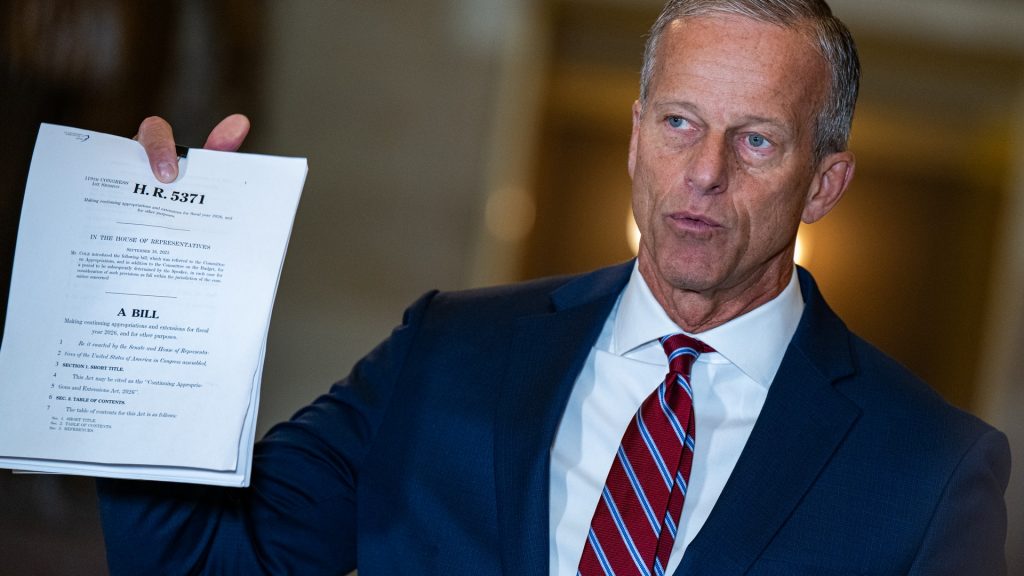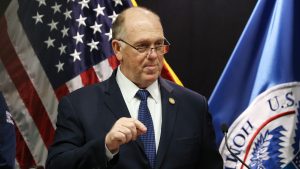Government shutdown extends into next week with failed Senate votes

The government shutdown will extend into next week after two pieces of legislation from Republicans and Democrats failed to get the mandatory 60 votes to pass. Subsidies on health insurance remain a dealbreaker for most Democrats.
Neither of the bills Senate Democrats or Republicans introduced on Friday afternoon received enough votes to pass, extending the shutdown into next week. As Sen. John Thune previously threatened, the Senate will be adjourned until Monday. Speculation rests on whether the government will reopen next week as House Speaker Mike Johnson, R-La., said the House won’t vote on legislation until the Senate passes a funding bill, The Associated Press reported.
Thune told Capitol Hill reporters he will fly home to South Dakota for the weekend.
Another vote on House Republicans’ stopgap measure failed Friday with 54 votes for, 44 against. The following Democrats broke with their party to support Republicans:
- Sen. John Fetterman, D-Pa.
- Sen. Catherine Cortez Masto, D-Nev.
- Sen. Angus King, I-Maine
Republicans have yet to win a favorable vote from Sen. Rand Paul, of Kentucky, who voted with Democrats to reject the bill. Sens. Chris Coons, D-Del., and Jerry Moran, R-Kan., didn’t vote.
Senate Minority Leader Chuck Schumer, D-N.Y., reintroduced Democrats’ spending bill, which would permanently extend tax credits on health insurance, allocate more funds for Medicaid and federal officials’ security and “extend expiring programs,” according to the congressional record. It failed to pass strictly along party lines, with Moran and Coons not voting. The bill received 46 votes in favor and 52 against.
After his bill failed, Schumer told reporters that the House is caring more about “protecting the Epstein files than protecting the American people,” CNN reported.
“Today we saw the Republicans run the same play and they got the same result,” he said. “The question is, will they change course? The votes aren’t there.”
Senate legislation on government spending
The federal shutdown entered its third day as the Senate is set to vote on spending bills that would reopen the government, if passed. Those bills could contain concessions The Wall Street Journal reported the White House is considering to avoid hurting Republicans’ chances at reelection in the 2026 midterms.
The paper reported that White House aides are reviewing proposals to extend tax credits for health insurance on the marketplace. Chatter about President Donald Trump’s advisers came as he wrote on Truth Social about Democrats wanting to give health care to unauthorized immigrants.
No matter where Trump stands on supporting his party members or conceding to Democrats’ demands, his position could affect the midterms, Republican strategist Whit Ayres told the Journal.
“It has the potential to be a significant issue,” Ayres said. “Whether it becomes one or not depends upon the course of the election.”
Passing the spending package could be tricky as Senate Majority Leader John Thune, R-S.D., has said he’ll send lawmakers home for the weekend if Democrats block his party’s continuing resolution. It’s the same tone other Republicans have, who told the Journal they’ll hold budget negotiations after the government reopens.
Online and on employees’ emails, the Trump administration blamed Democrats for the shutdown. Employees and lawmakers believed the messages could violate the Hatch Act, which limits politicking by federal employees.
“This is such an obvious violation of the Hatch Act that it raises the question: ‘How on Earth does HUD think they can get away with this?’” Craig Holman, a government ethics expert at Public Citizen, said in a statement. “The answer is that the Trump administration has managed to neuter the ethics enforcement offices in the executive branch.”
Health care prices to skyrocket without subsidies
According to health policy news site KFF, if the premium tax credits set for the Affordable Care Act aren’t renewed, some enrollees could lose coverage and their entire tax relief. The site said people pay an average of $888 annually for premium payments out-of-pocket in 2025. Without federal help, it rises to $1,904 for 2026.
KFF said as of 2025’s open enrollment, 22.3 million people received tax credits out of a total of 24.3 million enrollees.
“This means that enrollees are expected to pay a higher share of their income towards a benchmark premium plan in 2026 than they otherwise would have,” KFF reported. “Additionally, inflation in private insurance premiums has led to higher premium contribution levels than previously expected.”
In a separate report, KFF polled Americans and learned that 78% of the public wants Congress to extend tax credits for low and moderate income earners to make health care coverage in the marketplace more affordable. The poll also revealed that near-equal shares of the group felt Trump (39%) and Republicans (37%) deserve blame for letting credits expire, meanwhile 22% felt Democrats deserved blame.
“There is a hot debate in Washington about the looming ACA premium hikes, but our poll shows that most people in the marketplaces don’t know about them yet and are in for a shock when they learn about them in November,” KFF president and CEO Drew Altman said in a release, referencing the November open enrollment date for health insurance.
The post Government shutdown extends into next week with failed Senate votes appeared first on Straight Arrow News.





